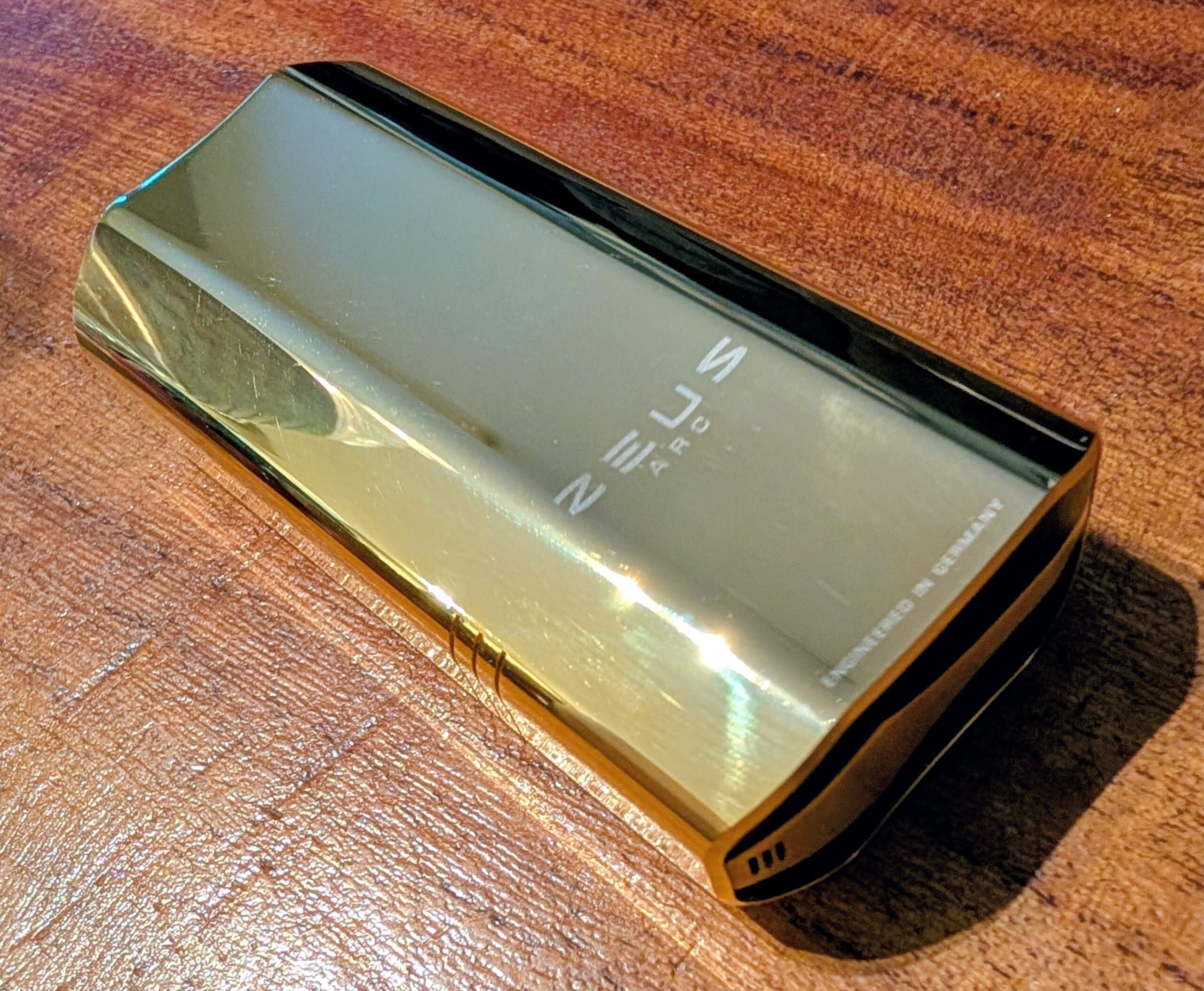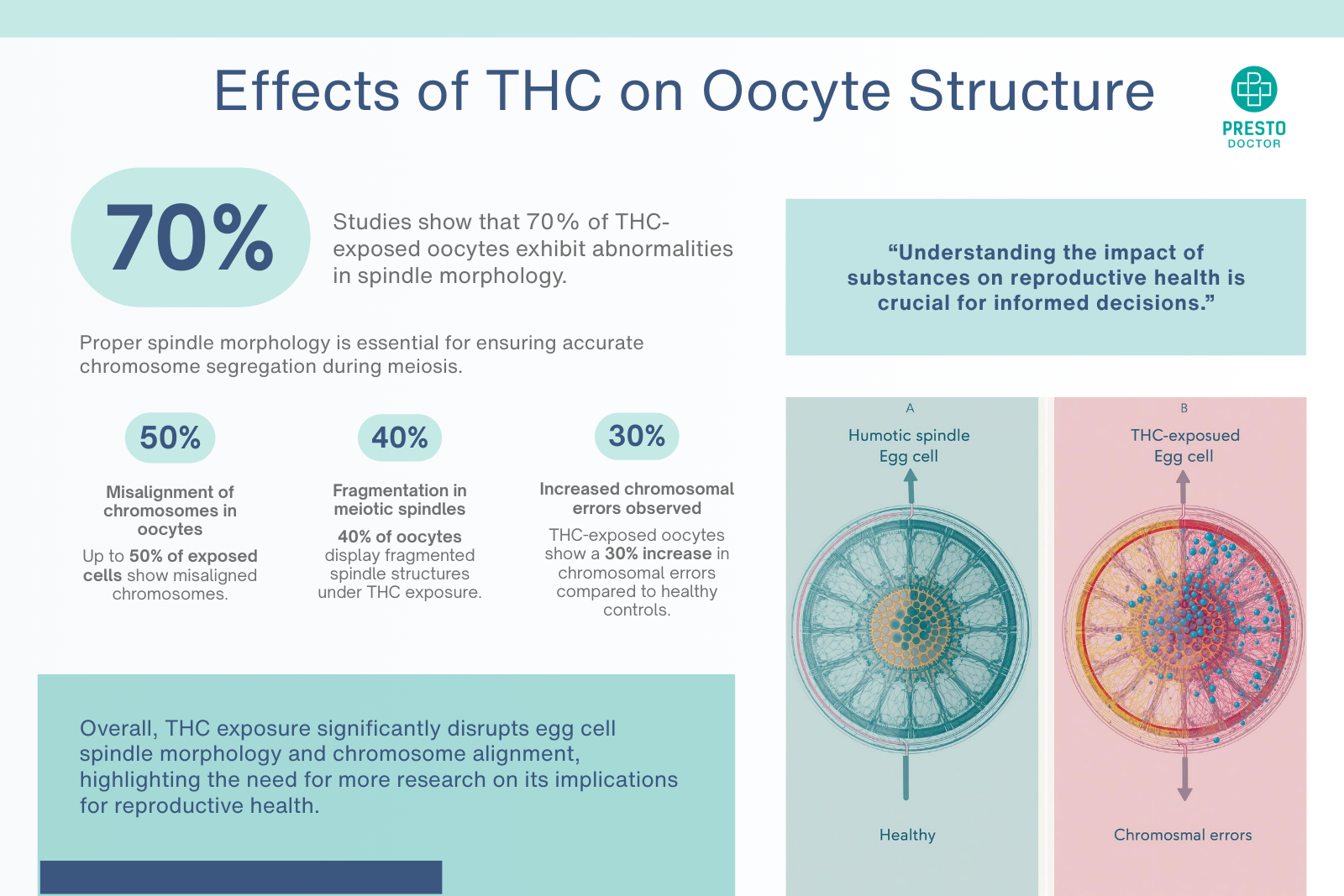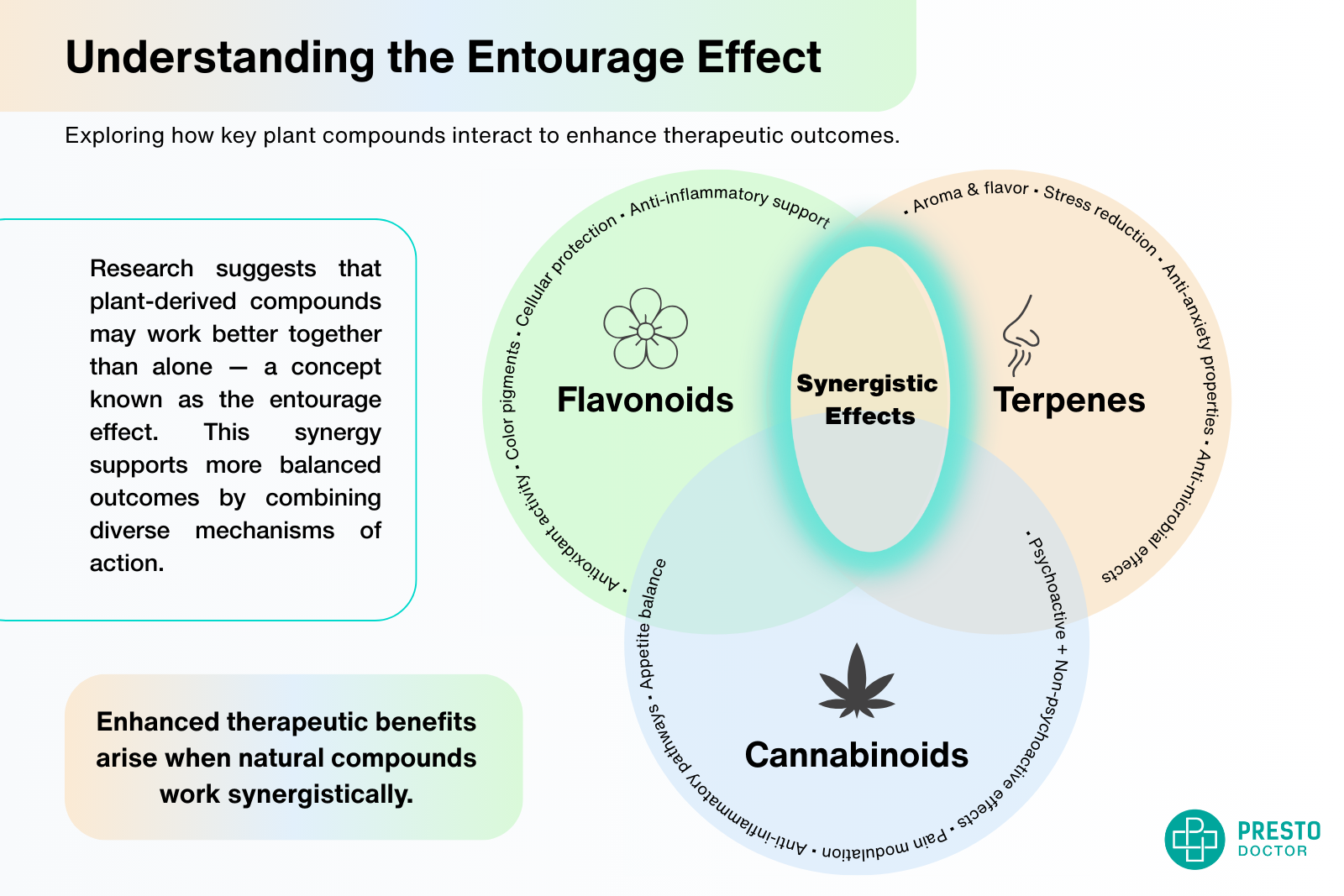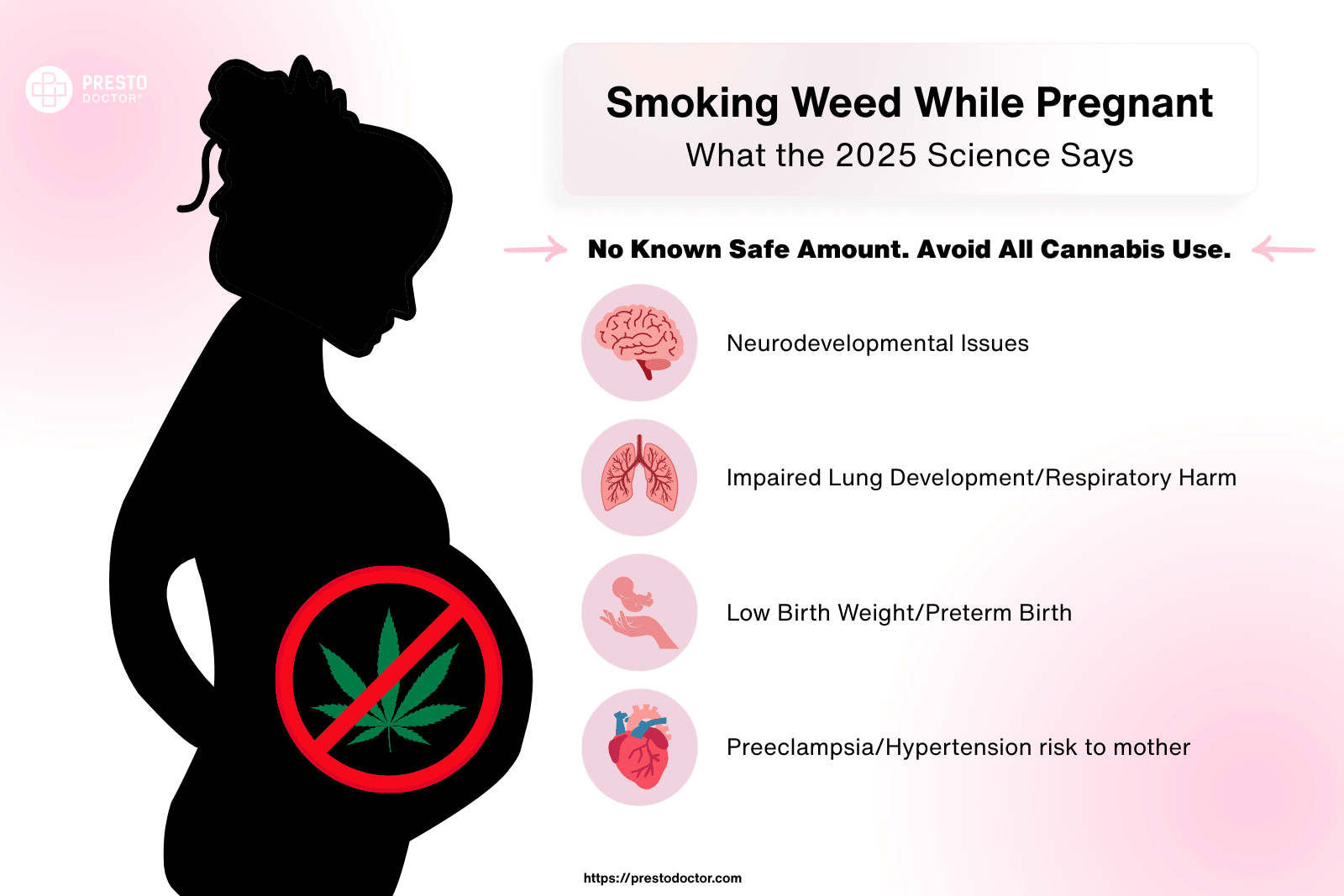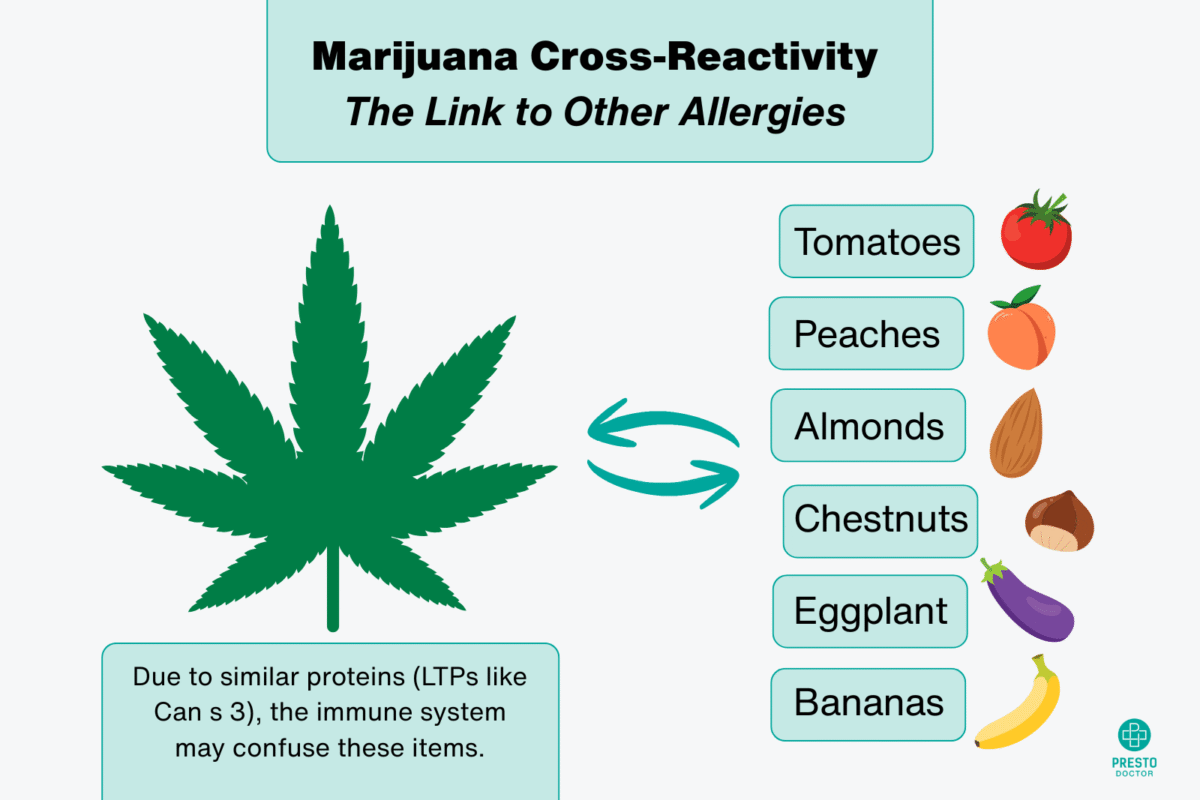
[This article is for informational purposes only and is not a substitute for professional medical advice. Please consult with a healthcare professional for diagnosis and treatment of any medical condition. This content was medically reviewed by a licensed physician from PrestoDoctor.]
As marijuana legalization expands and usage becomes more commonplace, a question is emerging that might surprise some: can you actually be allergic to cannabis?
The simple answer is yes, absolutely.
While many people focus on the effects of THC or CBD, marijuana is a plant, and like any other plant—from ragweed to peanuts—it contains proteins that can trigger an allergic reaction to weed in sensitive individuals.
If you or a patient have experienced unusual symptoms of a marijuana allergy after exposure to cannabis, here’s what our cannabis-specialized doctors at PrestoDoctor want you to know about recognizing, diagnosing, and managing a marijuana allergy.
What Causes the Allergy?
An allergy is an immune system overreaction to a harmless substance (an allergen). In the case of cannabis, the culprits are specific proteins found in the plant’s leaves, flowers, pollen, and seeds. The main allergens identified by researchers include specific proteins like Can s 3 (a lipid transfer protein) and Can s 4.
It’s not the psychoactive compounds like THC or CBD that cause the allergy; but rather it’s these structural proteins.
The risk of developing this allergy seems to increase with repeated or occupational exposure. People who work in the cannabis industry (cultivators, dispensary workers, etc.) are at a higher risk of becoming sensitized over time.
Common Symptoms of a Cannabis Allergy
Symptoms can range widely from mild to severe, depending on how you were exposed (inhaled, topical, or ingested) and how sensitive you are.
Inhaled Exposure (Smoking, Vaping, or Airborne Pollen)
For many people, exposure comes from breathing in the smoke or even just airborne pollen from nearby grow operations.
- Sneezing, runny or stuffy nose (allergic rhinitis)
- Itchy, watery, and red eyes (allergic conjunctivitis)
- Wheezing, coughing, or shortness of breath (asthma symptoms)
Skin Contact (Handling the Plant or Topical Products)
Direct contact with the plant material can cause a localized reaction, known as contact dermatitis. The following can happen.
- Hives (urticaria)
- Itching and redness
- A rash that can include blisters or dry, flaky skin
Ingestion (Edibles, Hemp Seeds, Oils)
While less common, consuming cannabis products can trigger digestive or systemic reactions.
- Nausea, vomiting, or diarrhea
- Abdominal pain
- Swelling of the lips, tongue, or throat (oral allergy syndrome)
Anaphylaxis: A Medical Emergency
In rare instances, a severe, life-threatening reaction called anaphylaxis can occur, usually after ingesting hemp seeds or high-concentration products.
Symptoms of anaphylaxis include difficulty breathing, a rapid drop in blood pressure, dizziness, and loss of consciousness. This is a medical emergency that requires immediate treatment with an epinephrine auto-injector (EpiPen) and also calling emergency services.
Marijuana Cross-Reactivity: The Link to Other Allergies
One fascinating aspect of marijuana allergy is “cross-reactivity.” This happens because cannabis proteins are similar to proteins found in other common plants and foods.
If you have allergies to any of the following, you may be more likely to react to cannabis:
- Tomatoes
- Peaches
- Almonds
- Chestnuts
- Eggplant
- Bananas
Diagnosis and Management
If you suspect you have a marijuana allergy, the first step is to immediately stop all exposure to the plant and its products. There is currently no cure for a cannabis allergy, therefore the most effective marijuana allergy treatment remains strict avoidance of the plant and its products.
The next step is to consult a healthcare professional, such as a board-certified allergist/immunologist. Diagnosis involves a detailed medical history and, often, skin prick testing using a diluted extract of the plant or blood tests for specific IgE antibodies.
As with most allergies, there is no “cure.” The primary treatment and prevention method is avoidance.
For managing mild symptoms of a marijuana allergy, over-the-counter antihistamines and nasal sprays may offer relief. Individuals with severe asthma symptoms may also require prescription inhalers. Your doctor can help create a management plan tailored to your specific symptoms.
Frequently Asked Questions (FAQ) About Marijuana Allergies
Yes. You can be specifically allergic to the airborne pollen from the male cannabis plant, causing respiratory symptoms like hay fever (allergic rhinitis). Conversely, some people only react to consuming specific proteins in the plant’s flowers or seeds.
Marijuana allergy symptoms typically appear within 20 to 30 minutes of exposure, although this can vary. Contact dermatitis reactions may take longer to manifest fully.
Red eyes are a very common side effect of smoking or ingesting cannabis due to the effects of THC (vasodilation), and not necessarily an allergic reaction. Allergic red eyes are usually accompanied by intense itching and watering.
There are no standardized commercial tests available yet. Allergists use skin prick tests with custom-made extracts from the actual plant material (leaves/buds) or specific blood tests that look for IgE antibodies to identified cannabis proteins (like Can s 3 and 4).
Yes, prolonged and repeated exposure to high concentrations of airborne cannabis allergens in cultivation or processing facilities significantly increases the risk of developing occupational allergies and asthma.
It depends on the purity of the CBD product. Full-spectrum products are riskier than pure CBD isolates, as they may contain residual plant proteins that could trigger an allergic reaction.
Not directly, but cannabis plants can be contaminated with molds (such as Aspergillus) during growth, harvesting, or storage. An allergic reaction to contaminated cannabis might actually be a reaction to the mold, not the plant itself.
Medical Cannabis Evaluations
If you’re concerned about marijuana allergies, symptoms, cross reactivity, or other cannabis-related health issues, book an appointment with a licensed PrestoDoctor physician. Our doctors are specialists in medical cannabis and can provide a personalized consultation.

